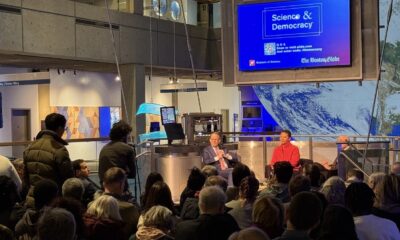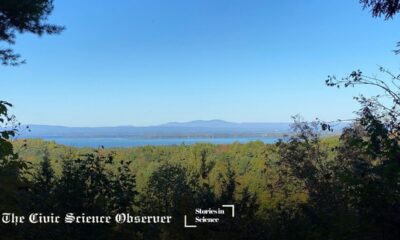Stories in Science Special Series
Ibn Al Haytham: The Father of Modern Optics
Though he wasn’t always successful and did not even start as a scientist by profession, his scientific legacy stands. Ibn al Haytham is one of many non-western scientists whose work has significantly contributed to building science as we know it today

Aiza Kabeer
[su_boxbox title=”About”]The story below is part of the Scientific Tradition (SciT) project from the Stem Advocacy Institute. My hope is that eventually this collection of stories will serve as an introductory resource to fill in the gap we have in science history, and benefit those who might not otherwise have found inspiration in the past. Stay tuned as we slowly but surely build a database that will present an alternative view of science history which can also be viewed on Medium. Learn more about the project HERE. [/su_boxbox]
[dropcap]I[/dropcap]t was the first time Ibn al Haytham had seen the Nile river. As he watched its waters flow past, he realized the enormity of his mistake. “I was overconfident”, he thought. “The knowledge and tools I have are not enough.” Though Ibn Al Haytham was previously the Mayor of Basra, Iraq, he also studied the sciences. Through his studies, he came up with an idea to dam the Nile river.1
Then Caliph Al Hakim heard about the idea and gave him the task of controlling the Nile’s annual flooding.1 The Caliph was known to be erratic and harsh,2 and Ibn Al Haytham feared the consequences of failure on this task. He realized his mistake could put him in danger. “I have to find a way to escape”, he thought.
Many stories say that Ibn Al Haytham feigned madness in order to avoid punishment and he was put under house arrest.2 Other stories say that he was imprisoned, and others yet say that he went into hiding.3 Some accounts even claim that it is during this time that Ibn Al Haytham wrote his famous Book of Optics.4 Whatever the truth is, we know that Ibn Al Haytham continued his scientific studies in hiding (or imprisonment) and eventually resumed public work after the Caliph Al Hakim disappears.4,5
Though he wasn’t always successful and he didn’t even start as a scientist by profession, his scientific legacy stands.
Though we don’t have a detailed account of his life, Ibn Al Haytham’s many contributions to science are known. He wrote books on astronomy and refuted the Ptolemaic model of the universe. He lived in a majority Muslim society, and used his knowledge to help calculate proper prayer directions and came up with an empirical method to disprove false prophets. He studied the roots of calculus, and the laws that govern motion between two bodies (gravity).5
Some of his more well known achievements are in the study of optics. He had always been fascinated with light since his childhood,5 and he was the first to study the pinhole camera.2 He corrected the false Greek belief that our eyes send light rays to objects. In fact, Ibn Al Haytham found that light hits our eyes and is conveyed to our brain through optic nerves.6 He even studied how light moves through different mediums, such as water or air, and he was able to calculate the depth of the earth’s atmosphere.2
Ibn Al Haytham lived from 965-1040.4 By the time he died, he had written over 200 works on subjects spanning astronomy, mathematics, medicine, engineering and optics.2
He developed an early version of the scientific method 200 years before scientists in the West did.4 Though he wasn’t always successful and he didn’t even start as a scientist by profession, his scientific legacy stands. Ibn al Haytham is one of many non-western scientists whose work has significantly contributed to building science as we know it today.
Because Ibn al Haytham made so many contributions to science, there are any number of his discoveries that one can be inspired by, or be impressed with. However, I believe we can take some universal reflections from his story.
Ibn Al Haytham shows us that failures do not mean you can’t produce impactful work (Maybe he couldn’t control the Nile, but he did have a huge impact on our knowledge of optics). We learn that being a scientist doesn’t mean you can’t be religious (In fact, Ibn Al Haytham used science to serve religious purposes). And in his story we see a culture and a place that produced an amazing scientist worthy of our recognition. We may not think to look at the Middle East or North Africa for scientific inspiration, but maybe that’s because we don’t know history.
“The duty of the man who investigates the writings of scientists, if learning the truth is his goal, is to make himself an enemy of all that he reads, and … attack it from every side. He should also suspect himself as he performs his critical examination of it, so that he may avoid falling into either prejudice or leniency.” — Ibn Al Haytham
Cover Image from Pixabay | Pixabay License
References
- Corbin H. History of Islamic Philosophy: Kegan Paul International in association with Islamic Publications Ltd; 1993.
- Al Khateeb F. Medieval Arab scholar Ibn al-Haytham and the book of Optics2017. Available from: http://www.egypttoday.com/Article/4/12587/Medieval-Arab-scholar-Ibn-al-Haytham-and-the-book-of.
- Al-Razouki MM. From Prisoner to Polymath: The Remarkable Story of Ibn Al-Haytham2018 2018-08-12. Available from: https://medium.com/@Mussaad/from-prisoner-to-polymath-the-remarkable-story-of-ibn-al-haytham-f5c3e3be80da.
- The ‘mad’ Egyptian scholar who proved Aristotle wrong2011. Available from: https://phys.org/news/2011-01-mad-egyptian-scholar-aristotle-wrong.html.
- Morgan MH. Lost History: National Geographic; 2008.
- Ahmad KJ. Hundred Great Muslims. Lahore: Ferozsons Ltd.; 1984.
Metrics
Sessions
Total number of Sessions. A session is the period time a user is actively engaged with the page.
Visitors
Users that have had at least one session within the selected date range. Includes both new and returning users.
Page views
Pageviews is the total number of time the article was viewed. Repeated views are counted.
The CS Media Lab is a Boston-anchored civic science news collective with local, national and global coverage on TV, digital print, and radio through CivicSciTV, CivicSciTimes, and CivicSciRadio. Programs include Questions of the Day, Changemakers, QuickTake, Consider This Next, Stories in Science, Sai Resident Collective and more.

-
Audio Studio1 month ago
“Reading it opened up a whole new world.” Kim Steele on building her company ‘Documentaries Don’t Work’
-
Civic Science Observer1 week ago
‘Science policy’ Google searches spiked in 2025. What does that mean?
-
Civic Science Observer1 month ago
Our developing civic science photojournalism experiment: Photos from 2025
-
Civic Science Observer1 month ago
Together again: Day 1 of the 2025 ASTC conference in black and white
Contact
Menu
Designed with WordPress

























